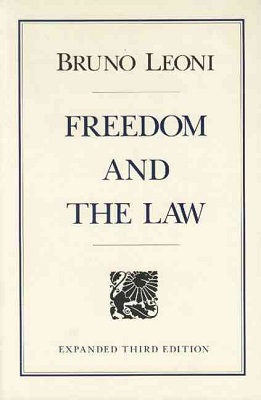
Arnold Kling has published on EconLib a fine article on Bruno Leoni’s Freedom and the Law. Leoni passed away fifty years ago, on November 21. The Liberty Fund has kept in print Freedom and the Law, Leoni’s book which originated out of a series of seminars at Claremont College in 1958. At the same event, F.A. Hayek presented lectures based on what was to become The Constitution of Liberty and Milton Friedman lectures based on what was to become Capitalism and Freedom. It is an event that, in the history of classical liberalism, may have the same importance as Bob Dylan’s performance at the 1965 Newport Folk Festival, when he first went electric.
Of the three books, Leoni’s was certainly the least successful, not least because he was not part of Anglo-American academia and because he died a few years later. But he had an impact both on law and economics and on contemporary libertarianism.
I think Arnold provides and excellent summary of Leoni’s work. Notice, in particular, these two bits:
Leoni claimed that the socialist calculation problem applies to legislation. That is, just as a central planner lacks the information that emerges in a market, a legislator lacks the information that emerges in case law.
This is the gist of Leoni’s argument. He was a devotee of Austrian economics and he applied his core insights to legislation. He also noticed that socialism was “legislation,” so to say, in the sense that you cannot have one without the other in a modern society. Planning required law making.
Our intuition tells us that legislation, by putting rules in writing, provides citizens with certainty. In theory, legislation gives us precise boundaries of what is legal and what is not. Against this, Leoni argued that in practice, legislation creates uncertainty, because laws can be changed suddenly and without warning. A business that is planned under one set of rules may become unprofitable under new legislation.
This is another core insight of Leoni’s work, which was highly skeptical about modern democracy. In our societies, Leoni argued, it isn’t true that we are governed by laws and thus we aren’t governed by men. Quite the opposite: the fact that we consider laws to be the product of Parliaments enables majorities of men to make and change the laws as they wish.
Leoni thought that a better kind of law could emerge by precedent, being “discovered” by the work of judges adjudicating controversies.
Arnold is skeptical of this argument, because “society today is highly complex in terms of the types of interactions and the number of people involved in interactions.” He sees this increase in the division of labour, and, thus, in the complexity of production, to require legislation to avoid multiplication of conflicts.
While I’m a fan of Specialization and Trade: A Re-introduction to Economics, I’m not so sure I would side with Arnold against Leoni on this. This argument suspiciously sounds too much like “all that is real is rational.” Well, indeed things exist for a reason. Once the modern world went for legislation, instead of taking other ways, legislation expanded gloriously, claiming that by so doing conflicts were to be minimized. Parliament-produced laws, and even more so regulatory agency-produced norms, are seen as more flexible and “efficient” than the extenuating work of judges appealing to precedents for their own legal reasoning.
But at the same time legislation is nowadays often considered not flexible enough, for example to accommodate technological novelties which threaten the status quo. And it doesn’t stop conflicts from proliferating, whenever they are considered worth the cost by conflicting parties: after all, legislation is certainly highly permeable to special interest groups’ bargaining and it is inevitably politicized.
Sure moving into the kind of “legal system” Leoni considered more conducive to a free society would be problematic, and perhaps altogether impossible in the world we live in. And yet it seems to me that we see a good number of people now looking outside the boundaries of state-monopolized law (think of private arbitrartion but also to the blockchain technology) in their search for systems of norms that do not show the same deficiencies of legislation which Leoni identified more than half a century ago.

READER COMMENTS
Bedarz Iliachi
Nov 15 2017 at 1:50am
I hadn’t heard of Leoni previously but I am impressed by his insights. The analogy to socialist calculation problem is impressive. I wonder why this line was not pursued in libertarian critiques.
gabe
Nov 15 2017 at 12:53pm
Here is a link to an essay that appeared at Law & Liberty some time back. Quite good synopsis of Leoni’s thinking.
http://www.libertylawsite.org/2014/07/17/when-friedrich-hayek-met-bruno-leoni/
Comments are closed.